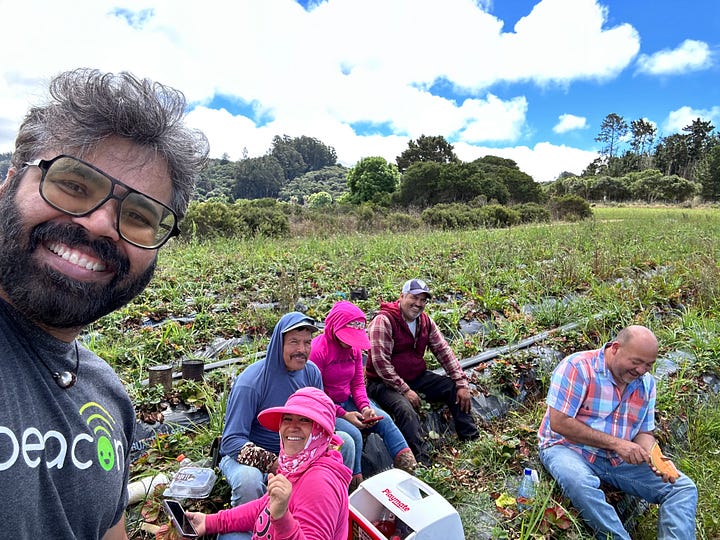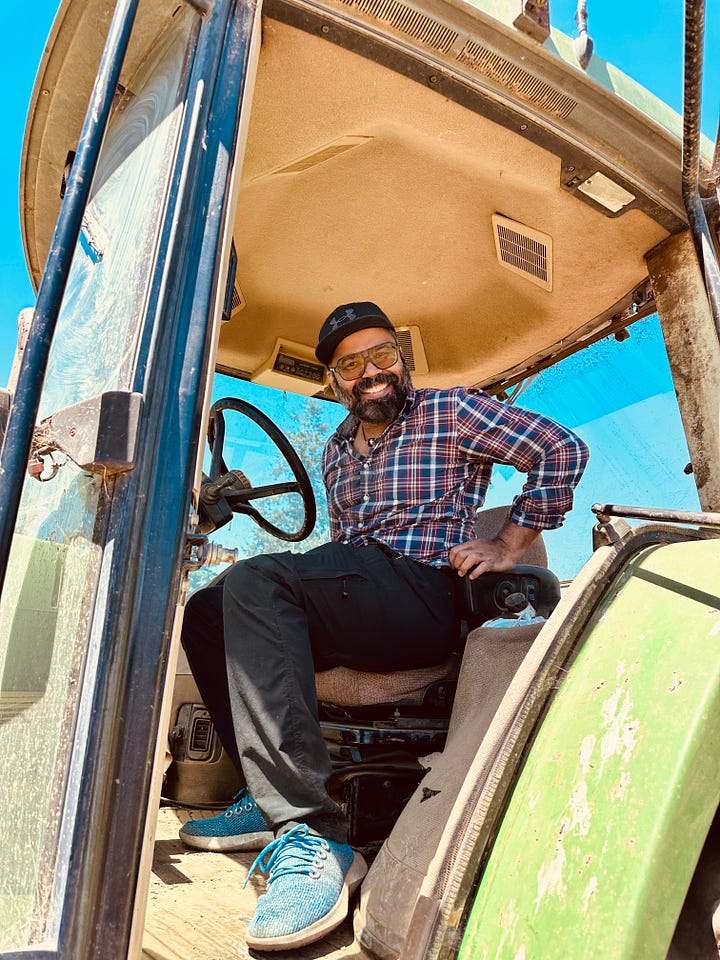It’s been 3 months since I embarked full time on my entrepreneurial journey. While there is a wealth of of valuable resources for aspiring entrepreneurs, I believe there is room for sharing one’s experiences real time, as they go through it. When you narrate a story in hindsight, you may unintentionally shape the events to fit the ending. Here I am, publishing a story as it is unravelling. The author has no idea how the plot is going to twist & turn :)
I will focus this post on how I got started, the chain of events over the last year and what helped me navigate a new space.
I will attempt to write this at a decently regular cadence and hopefully this helps someone somewhere.
1. Why this, why now
I have always had entrepreneurial aspirations. Even in all the large corporations I worked at, I have had the opportunity to spot problems, craft solutions, get buy-ins, prototype, build teams, scale and ship solutions. Outside of work, I have been into arts, choreographed various stage dance shows for non-profit. What gives me energy is the idea of bringing people together behind a mission and finding creative ways to solve problems and build value. Even just writing that last sentence gave me goosebumps:)
I got my green card last year and like for many other immigrants, that was a trigger for me to go pursue the passion.
2. Getting started
Climate change is like a looming thunderstorm on the horizon and I was pretty much set on wanting to use my expertise in contributing to something meaningful in the clean tech space.
Books & Conversations:
Books got me started on my exploration. Bill Gates’ ‘How to Avoid a Climate Disaster’ & John Doer’s ‘Speed & Scale’ helped me understand the class and scale of the problems and gave me a framework to think through. Electrification & Agriculture were areas that inspired me and I started to dive in deeper. I was also fortunate enough to be able to tap into my network of friends and ex-colleagues who were either founding or investing in companies in this space.
3. Navigating the Agriculture space
Agriculture’s impact on climate change through greenhouse gas emissions and the impact of climate change on agriculture is well documented. As I was exploring the clean tech space, I found myself gravitating towards farming and agriculture and the steep challenges associated with it. My bedtime reading would often involve topics like soil health and bio diversity and their influence on water retention and carbon sequestration.
Climate Farm School
Further research led me to Terra.do’s Climate Farm School. They offer a five week course on regenerative agriculture. The experience included residing on a ranch, learning about soil health, water management and importance of government policies. Additionally, it also included visits to various farms that have effectively adopted regenerative practices. For me, the emphasis was not only on understanding what technology can achieve but also recognizing its limitations
The Climate Farm School not just gave me some practical exposure, but also gave me a great opportunity to engage in meaningful conversations with farmers. What struck me as remarkable was the multitude of daily decisions farmers must make, the time sensitivity of these choices, and the profound implications of getting them right.
The caliber and diversity of individuals within my cohort, as well as the enriching conversations we engaged in, stood out as a highlight. This course not only provided me with newfound friends but also expanded my network in this space, leaving me with a strengthened sense of confidence in the direction I'm heading.
4. Farm Trips
Following the course, a few of us from the cohort teamed up and reached out to numerous small and medium scale organic and regenerative farms in northern California and put together an itinerary of farm trips. Talking to your users is the most important thing for a start up and my goal was to keenly listen and observe at every opportunity. I picked up a few things about how to get more value out of these user research interviews and I will write about it sometime.
One question I get frequently these days is, “how did you navigate into this new space and initiate conversations with farmers?”. 2 things that helped me:
Teaming up with my friends from the farm school cohort for the initial conversations helped me gain some confidence.
Every farmer that I have met has been super kind and made me feel right at home.
I want to give a big shout out to a couple of farms that I have fostered strong relationships with. They've not only warmly opened their doors for me to test my ideas but have also been an incredible source of support. I have always gone back home with a fruit or berry basket!
JSM Organics
Javier and his team have been growing organic food since 2012. Javier has been so generous to me with his time, sharing his experience and giving me feedback. He is so transparent and is always open to sharing any details about his operations. Javier & his team have helped me without any expectations and been a great reminder to me that valuable relationships are built on trust, not transactions.


Frog Hollow Farm
If ever there was a farming equivalent of a rockstar, that would be Farmer Al from Frog Hollow farm. His infectious energy and enthusiasm is captivating and he is highly respected for his wealth of knowledge. He and his team are encouraging and open to new ideas and their feedback has given me confidence that I’m at least on the right track. An interesting tidbit: Al was Obama’s history teacher in Hawaii, before he took up farming!
I have linked the farm websites above. I highly recommend their produce. Please do support if you can!
5. Volunteering at AgLantis
Meanwhile, my research also led me to finding a volunteering opportunity at a sustainable farm called CoCo San in Martinez. It is a community non-profit farm with an amazing business model. Carolyn Phinney, the president, leased 15 acres near the Contra Costa Sewage Water treatment facility and started growing crops following regenerative agriculture practices and using the treated water from the facility for irrigation. The recycled water is rich in organic nitrogen and other micronutrients. It is volunteer driven and the produce gets donated to food banks and Loaves & Fishes. Read their amazing story here!
Being able to get my hands dirty (literally) and getting to know the nuances that can be only be possible when you are out there on the field, has been incredibly helpful. It’s also a great place to meet like minded techies who volunteer at the farm.
Carolyn holds a PhD in psychology and is not only a farmer but also a political activist. She has welcomed me into her team and I’m proud to be part of her think tank, as we try to refine the operations here and scale this model. She has been mentoring me and providing me direct, no-nonsense feedback and helping me understand the farmer’s perspective. I’m so thankful that I found this opportunity!
5. What am I working on
People ask me if I’m on stealth mode. I answer them that I’m on super stealth mode, because I myself don’t yet know what I’m working on :). Well, if you are potential investor, I want you to read it as “I have an idea, but I’m still working on validating it by talking to more users, before diving in to build it” :). Tony Fadell’s advice on providing painkillers vs vitamins in his book “Build” & Paul Graham’s note on finding problems that are narrow and deep like a well are some of my main frameworks for validating ideas. I have already pivoted from what I started off with, based on all the feedback from my users so far.
I will share more as I get more confidence and build enough conviction. I do know that I want to build something for the small and medium scale farmers. 89% of the US farms have a gross annual income of less than 350k and most of the income for small farmers come from off-farm incomes. They are operating on tight margins and ROI is critical. Helping them to do climate-smart farming without compromising on profitability is what I consider to be my mission. Btw, if you can introduce me to any farms that you know of, I’d greatly appreciate that!
AI (I managed to not bring it up until now), is at an interesting phase (stating the obvious) and I think applying it in the farming vertical can help with the goal. I did some neural networks back in grad school before it was cool :) I have been re-learning and playing around with it in parallel.
6. Gratitude
One of the leaders at Meta whose notes I loved reading, always ended his note with gratitude. I want to do the same as well.
Besides the folks mentioned in this note, I have received help from so many people over the last few months, often from completely unexpected avenues. It has been overwhelming and I wanted to thank all of those folks (you know who you are) and I promise to pay it forward.
If you have read this far, thank you to you as well :) I’d appreciate if you can subscribe, that will encourage me to write more. I promise to keep the next ones short :)
Finally, I can’t predict my success as an entrepreneur in this space. But no matter what the outcome is, I will be involved in farming one way or another.








